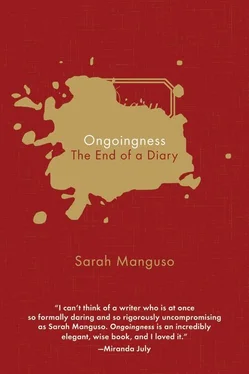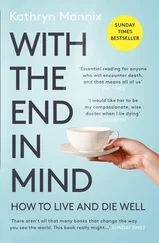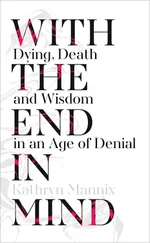It used to be that things always reminded me of a lot of other things.
Then, for eighteen months or so, they didn’t. In the diary I recorded only facts. Minutes of nursing, ounces of milk, hours of sleep.
Things were just themselves. I was too exhausted or hormone-drunk or depressed to think of anything that resembled anything else.
That’s how things appear to an infant. ♦
One postpartum day it took me forever to remember the word obsolete. Another day, suggestible. Another, fennel. Does the mother of an infant need a smaller lexicon? Does she need a specifically limited lexicon? Did I not need to think about fennel then? About abstractions? ♦
I remember from childhood that, from the point of view of a child, a mother is a fixed entity, a monolith, not a changing, evolving human organism who is qualitatively similar, in many ways, to a young person.
Recently I became not quantifiably old but qualitatively old. Old as a state of being. As an acceptance that I’ve more or less become the person I had a chance to become.
I’ve been basically the same person since I had my son. I know this isn’t true for all new mothers, especially those who are younger than I am (and most of them are). But I feel like a monolith now. I’ve emerged from a gauntlet, and it has something to do with having become a mother, and it has something to do with having become qualitatively old, and it has something to do with having run out of time and life to perceive and ruminate and record my minutes and days in the diary.
What I’m saying is that I have become, in a way, inured to the passage of time. I’m not really paying attention to what’s happening to me anymore — no longer observing steadfastly the things that have changed since yesterday. ♦
I’m watching my little son change, though, from day to day and minute to minute. Watching him learn things is like watching a machine become intelligent, or an animal become a different animal. It’s terrifying and beautiful, and this has all been said before.
On the island where my husband grew up and where his mother lived and died, we see a rainbow every day. Not just a segment of a rainbow fading in and out but the whole bright bow of it, sometimes in double and triple arcs. Rainbows are so common there, they print them on the drivers’ licenses. They are no less amazing for their prevalence. Ditto birds, trees, stars, clouds, children, and so on. To the laws of supply and demand the real world is immune. ♦
When the baby was eight months old, I realized I’d stopped identifying with the man saying Hi, Mom! and felt myself becoming the mother who hears him say it, the mother who will someday leave her boy alone. ♦
The essential problem of ongoingness is that one must contemplate time as that very time, that very subject of one’s contemplation, disappears.
My prose began to judge or summarize its subject before it took any time to observe that subject. I couldn’t help attaching that tendency to the subject itself: the wild velocity of motherhood, an enforced momentum forbidding contemplation.
The tendency to summarize rather than to observe and describe — would taking that time to observe and describe be selfish, wasteful, nonmaternal time?
Is it possible to truly observe one’s own child, as a writer must, while also simultaneously loving him? Does a mother have something like writer’s block— perceiver’s block? ♦
Left alone in time, memories harden into summaries. The originals become almost irretrievable.
One day the baby gently sat his little blue dog in his booster seat and offered it a piece of pancake. The memory should already be fading, but when I bring it up I almost choke on it — an incapacitating sweetness.
The memory throbs. Left alone in time, it is growing stronger.
The baby had never seen anyone feed a toy a pancake. He invented it. Think of the love necessary to invent that. In a handful of years he’ll never do it again. An unbearable sweetness.
The feeling strengthens the more I remember it. It isn’t wearing smooth. It’s getting bigger, an outgrowth of new love. ♦
Since the baby was born I still occasionally wonder whether I should have a baby, whether I should get married, whether I should move to this or that city I’ve already moved to, already left. All the large questions still float about me, and in its sleep-deprived dampened awareness of the present moment, my memory treats these past moments as if they’re all still happening.
I’ve never understood so clearly that linear time is a summary of actual time, of All Time, of the forever that has always been happening. ♦
A year postpartum, my memory was still afflicted. I enjoyed writing because within days, I forgot what I’d written, and rereading it was like reading a letter from someone else.
In class my students repeated what they claimed I’d said during the previous class, and, not remembering the words as my own, I found myself approving of them vaguely. ♦
My life felt full before I became a mother, but I’ve found that trying to say that I prefer having the baby to not having him sounds aggressive. In fact I’d felt affronted, before I was a parent, when parents told me, even in the gentlest terms, that they preferred having their children to not having them.
Maybe the trouble is that the shape of life is elastic, that it can feel and be full at variable levels of fullness. Or maybe we’re poor judges of our own lives’ fullness. Or maybe the concepts of emptiness and fullness are poor metaphors for happiness, if in fact happiness is what we’re talking about. ♦
Let me put it another way: when I am with my son I feel the bracing speed of the one-way journey that guides human experience. ♦
The trouble was that I failed to record so much , I wrote, but how could I have believed that if I tried hard enough, I could remember everything? ♦
I wrote about an illness once I was seven years into a remission that lasted four more.
I didn’t know it yet, but the illness, which still isn’t over, wasn’t the real problem. Thinking about it was the problem, and I don’t think about it anymore. Not in the obsessive, all-consuming way I used to.
I used to harbor a continuous worry that I’d forget what had happened, that I’d fail to notice what was happening. I worried that something terrible would happen because I’d forgotten what had already happened.
Perhaps all anxiety might derive from a fixation on moments — an inability to accept life as ongoing. ♦
Once I’d spent two years hobbled by an impaired memory, I worried less about everything I was forgetting.
I forgot to buy milk this week. I forgot to file taxes last year. And on I go. ♦
The best thing about time passing is the privilege of running out of it, of watching the wave of mortality break over me and everyone I know. No more time, no more potential. The privilege of ruling things out. Finishing. Knowing I’m finished. And knowing time will go on without me.
Look at me, dancing my little dance for a few moments against the background of eternity. ♦
Why, then, should I continue writing the diary?
Читать дальше












